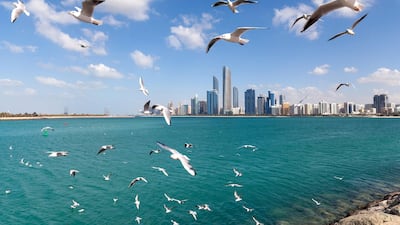Abu Dhabi's government plans to issue tenders worth Dh10 billion under the public-private partnership (PPP) model to boost infrastructure investment in the emirate.
The tenders are part of an initiative dedicated to increasing the use of PPPs and encouraging private sector involvement through the Dh50 billion Ghadan 21 accelerator programme launched by Sheikh Mohamed bin Zayed Al Nahyan, Crown Prince of Abu Dhabi, Deputy Supreme Commander of the UAE Armed Forces and Chairman of the Abu Dhabi Executive Council last year.
“Today’s announcement ... marks a milestone in our commitment to partner with the private sector to drive Abu Dhabi’s economic transformation,” said Mohammed Ali Al Shorafa Al Hammadi, chairman of the Abu Dhabi Department of Economic Development and the Abu Dhabi Investment Office.
“Through the public-private partnerships initiative, the government is providing the private sector with more certainty and transparency around the development and procurement of major infrastructure projects in Abu Dhabi,” he said.
Public-private partnerships are a method that allow a consortium of bidders to design, build, finance and operate an infrastructure asset over long periods of up to 20-30 years. The projects are backed by private financiers, who receive a regular income stream from the asset during the period.
The projects earmarked for development in Abu Dhabi span various sectors including social, municipal and transportation assets, according to a statement from the Abu Dhabi government media office.
The tenders come following the issuance of a law last year to regulate partnerships between public and private sectors. The Abu Dhabi Investment Office, which has a remit to encourage private sector investment in the emirate, is working on its delivery.
The PPP model will give clarity to prospective bidders by providing guidelines on joint structures and ways of working between the government and the private sector. It also details deregulatory measures to facilitate the contract award process, the statement said.
Ghadan 21 has facilitated a series of initiatives, including the launch of Abu Dhabi's new technology centre, Hub71, now home to 39 start-ups.
A new Ventures Fund worth Dh535 million was also rolled out to boost start-ups.
The fund has invested more than Dh60m in several start-ups and a fund manager, including in technology companies Securrency, Trukker, Sarwa, Yacob and Okadoc – all of which are either based in Abu Dhabi or are expanding into the capital.
Other initiatives have been launched to support small businesses, research and development and the housing sector.
"Ghadan 21 is playing a critical role in fostering this shift in Abu Dhabi, and the programme is commencing its second year on a solid footing by weaving the private sector even further into the fabric of our development initiatives," Mr Al Hammadi said.
Analysts welcomed the move to facilitate private sector investment into Abu Dhabi's infrastructure.
“The scope for financing and managing infrastructure through PPP is very promising and wide in the UAE. It attracts private sector investment, new technology and improves the efficiency and sustainability of any project. It also provides a greater role for capital markets in financing projects,” said Nasser Saidi, founder and president of Nasser Saidi & Associates.
Public-private partnerships offer "the benefit of bringing private expertise and capital, while helping to develop the projects in conjunction with the government", said Monica Malik, chief economist at Abu Dhabi Commercial Bank.
She also said higher levels of investment would support economic activity. Earlier this month, ADCB forecast non-oil growth in the UAE would accelerate to 2.3 per cent this year, up from an estimated 1.7 per cent in 2019 on the back of building investment momentum in Abu Dhabi and Dubai's hosting of Expo 2020.
"Our real non-oil GDP growth forecast already assumes an expansionary fiscal stance. Domestic support will particularly be important given the challenging external backdrop at the beginning of the year.”


